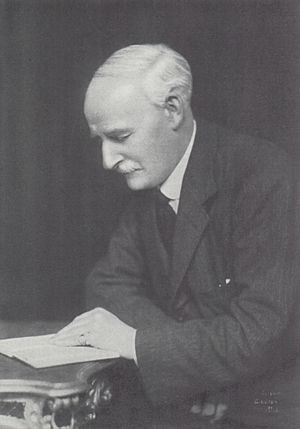Arthur Smithells facts for kids
Quick facts for kids
Arthur Smithells
|
|
|---|---|
 |
|
| Born | 24 May 1860 Bury, England
|
| Died | 8 February 1939 (aged 78) London, England
|
| Nationality | British |
| Known for | Research on flames |
| Children | Philip Ashton Smithells |
| Awards | Companion of the Order of St Michael and St George (1918) |
| Scientific career | |
| Fields | Chemistry |
Arthur Smithells (born May 24, 1860 – died February 24, 1939) was an important British chemist. He was especially known for his studies on how flames work. He also received a special award called the CMG and was a Fellow of the Royal Society (FRS).
Contents
Early Life and Learning
Arthur Smithells was born in Bury, Lancashire on May 24, 1860. His father, James Smithells, worked as a railway manager. Arthur went to the University of Glasgow to study.
Later, he continued his studies at Owens College in Manchester. He earned his Bachelor of Science (BSc) degree from the University of London. He also took more classes in Munich and with a famous scientist named Robert Bunsen at Heidelberg University.
Working as a Scientist
In 1883, Smithells started working as an assistant teacher at Owens College. Two years later, he became a Professor of Chemistry at the Yorkshire College in Leeds. This college later became the University of Leeds in 1904.
Smithells eventually became a high-ranking leader at the University of Leeds. He was called the Pro-Vice-Chancellor. He held this important job until he retired in 1923.
During his career, Smithells also advised King's College London on home science. He was also the President of the Society of British Gas Industries in 1911.
From 1923 to 1937, he directed the Salters’ Institute of Industrial Chemistry. In this role, he helped decide who would receive money for chemistry projects.
His main scientific work was about flames. He studied how things burn and how light comes from flames.
Special Awards and Honours
During the First World War, Smithells helped the British Army. He advised them on chemical matters. He became a Lieutenant-Colonel and was the Chief Chemical Adviser for anti-gas training.
For his service, he received the Companion of the Order of St Michael and St George (CMG) award in 1918. This is a special honour given by the British Crown.
In 1901, he was chosen as a Fellow of the Royal Society. This is a very respected group of scientists. He even became its vice-president in 1916. He was also a Fellow of the Royal Institute of Chemistry. He served as its President from 1927 to 1930.
His Family
Arthur Smithells had a son named Philip Ashton Smithells. Philip became a professor at the University of Otago in New Zealand. He taught about physical education.
His Death
Arthur Smithells passed away on February 24, 1939. He was 78 years old.
 | Dorothy Vaughan |
 | Charles Henry Turner |
 | Hildrus Poindexter |
 | Henry Cecil McBay |

